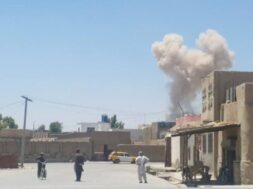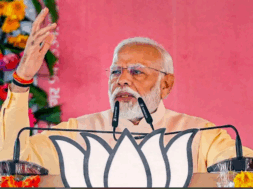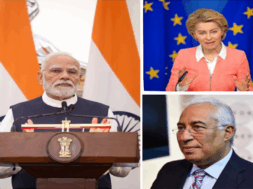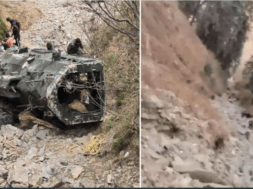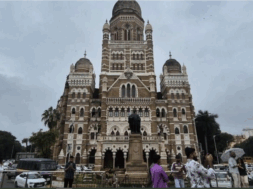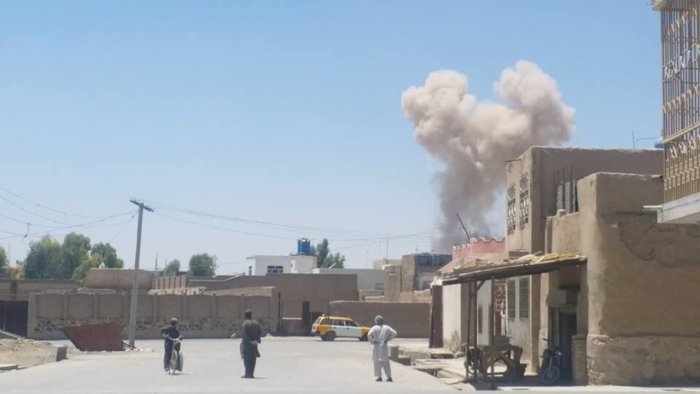
32 killed, 53 Injured in Another Blast in Shia Mosque in Afghanistan
Manas Dasgupta
NEW DELHI, Oct 15: In yet another targeted killing of the minority Shia Muslims in the Sunni Muslims dominated Afghanistan, at least 32 people were killed and 53 injured in a blast that tore through a Shia mosque during the Friday prayers in the southern Afghan city of Kandahar.
Agency reports from Afghanistan expressed the apprehension that the casualty figure and the number of injured could rise further as more rescue and relief operations were carried out. The mosque was jam-packed with worshippers when the blasts tore through the religious place in the afternoon.
The cause of the explosions was not immediately clear, but they came a week after a similar suicide attack on Shia worshippers at a mosque in the northern city of Kunduz during the Friday afternoon prayers last week in which over 100 people were killed and scores of others were injured. The Kunduz blast was later claimed by the Islamic State group, a rival terrorist faction of the Afghanistan-rulers Taliban.
A doctor at Kandahar’s central Mirwais hospital said “Thirty-two bodies and 53 wounded people have been brought to our hospital so far.” Other medical sources and a provincial official confirmed a toll of more than 30, and at least 15 ambulances were rushing to and from the scene. The mosque’s Facebook account made an appeal for blood donations.
An eyewitness said he heard three explosions, one at the main door of the mosque, another at a southern area, and a third where worshippers wash before their prayers. Another witness also said three blasts rocked the mosque in the centre of the town during Friday prayers, the busiest congregation of the week.
Heavy casualties are feared as the blasts occurred during the busiest congregation of the week at the Imam Bargah mosque in Kandahar.
Videos and images posted by local journalists on social media showed dead bodies and critically injured people lying on the floor of the Shiite mosque. A Taliban spokesperson for the interior ministry said that authorities were collecting details on the explosion. No group has claimed responsibility for the attack but the Islamic State has been targeting the minority Shiite Muslims in the Sunni-dominated nation.
“We are saddened to learn that an explosion took place in a mosque of the Shia brotherhood in the first district of Kandahar city in which a number of our compatriots were martyred and wounded,” tweeted interior ministry spokesman Qari Sayed Khosti, of the Taliban movement that rules Afghanistan.
“Special forces of the Islamic Emirate have arrived in the area to determine the nature of the incident and bring the perpetrators to justice.”
The Taliban, which seized control of Afghanistan in mid-August after overthrowing the US-backed government, has its own history of persecuting Shiites. But the new Taliban-led government has vowed to stabilise the country, and in the wake of the Kunduz attack promised to protect the Shia minority now living under its rule.
Shias make up roughly 10% of the Afghan population. Many of them are Hazara, an ethnic group that has been persecuted in Afghanistan for decades. In October 2017, an IS suicide attacker struck a Shiite mosque in the west of Kabul, killing 56 people and wounding 55.
The blast, coming so soon after the Kunduz attack underlined the increasingly uncertain security in Afghanistan as the Taliban grapple with an escalating economic and humanitarian crisis that threatens millions with hunger. The local affiliate of ISIS, known as Islamic State Khorasan, after an ancient name for the region covering Afghanistan, has stepped up attacks following the Taliban victory over the Western-backed government in Kabul in August.
Taliban officials have played down the threat from Islamic State but the repeated attacks have tarnished its claim to have brought peace to Afghanistan after four decades of war. The fact that the Shi’ite minority has again been targeted may also inflame tensions among different ethnic and sectarian groups in the largely Sunni country.
